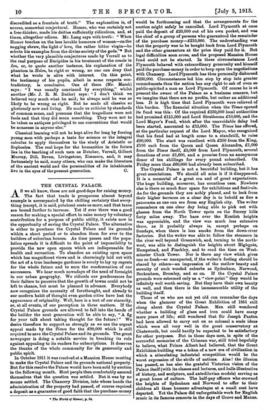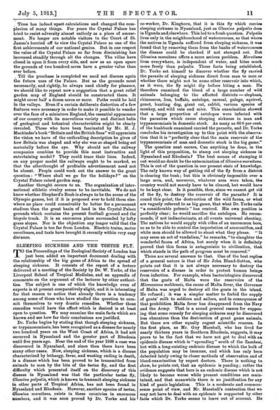THE CRYSTAL PALACE.
AS we all know, these are not good days for raising money. The fact that trade is prosperous almost beyond example is accompanied by the chilling certainty that every- thing (except, it is said, potatoes) costs us more, and that taxes
are bound further to increase. Yet if ever there was a good reason for making a special effort to raise money by voluntary contribution for a purpose of public utility, it exists now in the opportunity of saving the Crystal Palace. The alternative is either to purchase the Crystal Palace and its grounds within a short period or to abandon them for ever to the builders of suburban houses. As time passes and the popu- lation spreads it is difficult to the point of impossibility to provide the new open spaces which are indispensable for health and recreation. To abandon an existing open space which has magnificent views and is charmingly laid out with the art of a true landscape gardener is surely to lay up regrets for the whole future and to earn the condemnation of our successors. We hear much nowadays of the need of foresight in our urban geography. We ridicule our predecessors for their failure to perceive that the growth of towns could not be left to chance, but must be planned in advance. Everybody now recognizes the necessity of forethought, and already to our modern habit of thought even garden cities have lost the appearance of originality. Well, here is a test of our sincerity, or, at all events, of our perception in these matters. If the Crystal Palace grounds are allowed to fall into the hands of the builder the next generation will be able to say, " A fig for your talk about taking thought for the future!" We desire therefore to support as strongly as we can the urgent appeal made by the Times for the £90,000 which is still required to save the Crystal Palace and its grounds. The great newspaper is doing a notable service in breaking its rule against appealing to its readers for subscriptions. It deserves the thanks of the whole community for its generosity and public spirit.
In October 1911 it was resolved at a Mansion House meeting to make the Crystal Palace and its grounds national property. But for this resolve the Palace would have been sold by auction in the following month. Most people then comfortably assured themselves that the question was settled. But it was by no means settled. The Chancery Division, into whose bands the administration of the property had passed, of course required a deposit as a guarantee of good faith that the purchase-money
• The Worki of Homer, p.
would be forthcoming and that the arrangements for the auction might safely be cancelled. Lord Plymouth at once paid the deposit of £20,000 out of his own pocket, and was the chief of a group of persona who guaranteed the remainder of the purchase money-4210,000. The understanding was that the property was to be bought back from Lord Plymouth and the other guarantors at the price they paid for it. But legal difficulties soon arose, and the proposed Mansion House fund could not be started. In these circumstances Lord Plymouth behaved with extraordinary generosity and himself paid the purchase-money in order to keep open the negotiations with Chancery. Lord Plymouth has thus personally disbursed £230,000. Circumstances led him step by step into greater commitments than the nation has any right to ask of even so public-spirited a man as Lord Plymouth. Of course he is at present the owner of the Palace as a business concern, but we imagine that there are no profits, but rather an additional loss. It is high time that Lord Plymouth were relieved of this burden. The financial situation when the Times opened its fund was this : Of the required £230,000 local authorities had promised £115,000 and Lord Strathcona £10,000, and the Lord Mayor's Fund, which after the unavoidable delay had been started, amounted to £15,000. The Times has offered, at the particular request of the Lord Mayor, who recognized that his fund had at length come to a standstill, to raise £90,000. The start was excellent with £200 from the King, £100 each from the Queen and Queen Alexandra, £1,000 from the Times itself, £5,000 from Lord Plymouth, several donations of over £1,000, and a promise from an anonymous donor of ten shillings for every pound subscribed. On Friday more than £60,000 had already been subscribed.
The Crystal Palace is not a beautiful building, but it has great associations. We should all miss it if it disappeared. It is a memorial of a great era and of great expectations. The huge building, moreover, has countless uses. Nowhere else is there so much floor space for exhibitions and festivals. As for the grounds they are nobly placed, and to look from their higher terraces on a clear day is to behold as fine a panorama as one can see from any English city. The writer remembers on one clear day being able to pick out with glasses from the North Tower spots on the Surrey hills forty miles away. The haze over the Kentish heights was appreciable, and the view was much less extensive there, as it probably always is, except perhaps on Sundays, when there is less smoke from the down-river factories. But the writer was able to follow the steamers in the river well beyond Greenwich, and, turning to the north- west, was able to distinguish the heights about Highgate, Hampstead, and Finchley, and to read the time on West- minster Clock Tower. Nor is there any view which gives one so fresh—so unexpected, if :the writer's feeling should be shared by others—an impression of the mellow beauty and serenity of such wooded suburbs as Sydenham, Norwood, Beckenham, Bromley, and so on. If the Crystal Palace grounds were esteemed only as a " view-point " they would be infinitely well worth saving. But they have their own beauty as well, and then there is the immeasurable utility of the building itself.
Those of us who are not yet old can remember the clays when the glamour of the Great Exhibition of 1851 still clung about the Crystal Palace. Men still wondered whether a building of glass and iron could have many more years of life; still wondered that Sir Joseph Paxton had been allowed to carry out on so colossal a scale ideas which were all very well in the great conservatory at Chatsworth, but could hardly be expected to be satisfactory for other purposes. But in those days men, in spite of the sorrowful memories of the Crimean war, still tried hopefully to believe, what Prince Albert had believed, that the Great Exhibition building was a token of a new era of civilization in which a stimulating industrial competition would be the worst expression of the strife of nations. Alas ! the illusion has passed, as has also the grateful Victorian vision of the Palace itself (with its classes and lectures, and halls illustrative of history, and sculpture, and antediluvian models) serving as a great home of culture. The half-pay officers who crowned the heights of Sydenham and Norwood to offer to their children all these humane advantages at a small cost have departed. Yet the Palace did unforgettable work for English music in its famous concerts in the days of Grove and Manus.
Time has indeed upset calculations and changed the com- plexion of many things. For years the Crystal Palace has tried to resist adversity almost entirely as a place of amuse- ment. No longer are notable visitors to the Court of St. James's hurried off to view the Crystal Palace as one of the that achievements of our national genius. But in one respect the value of the Crystal Palace so far from diminishing has increased steadily through all the changes. The villas have closed in upon it from every aide, and now as an open space the grounds of two hundred acres have a greater value than ever before.
Till the purchase is completed we need not discuss again the future uses of the Palace. But as the grounds must necessarily, and rightly, be always used chiefly for pleasure, we should like to repeat now a suggestion that a great relief garden map of England should be constructed there. It might cover half a dozen acres or more. Paths could be laid in the valleys. Even if a certain deliberate distortion of a few features were necessary in order to make it possible to wander over the face of a miniature England, the essential appearance of our country with its marvellous variety and distinct belts of geological and botanical characteristics might be clearly revealed. Those who have been fascinated by Mr. H. J. Mackinder's book "Britain and the British Seas" will appreciate the vision we have of the enthralling description be gives of bow Britain was shaped and why she was so shaped being set materially before the eye. Why should not the railway companies combine to provide this most instructive and entertaining model P They could trace their lines. Indeed, on any proper model the railways ought to he marked, so that the afterthought of profitable advertisement need not be absent. People could work out the answer to the great question : "Where shall we go for the holidays P" on the Crystal Palace raised garden map.
Another thought occurs to us. The organization of inter- national athletic rivalry seems to be inevitable. We do not know whether Shepherd's Bush is always to be the scene of the Olympic games, but if it is proposed ever to hold them else- where no place could conceivably be better for a permanent stadium than the great basin of land in the Crystal Palace grounds which contains the present football ground and the bicycle track. It is an enormous place surrounded by lofty grass slopes. Nor is the objection any longer valid that the Crystal Palace is too far from London. Electric trains, motor omnibuses, and taxis have brought it recently within very easy distance.



















































 Previous page
Previous page